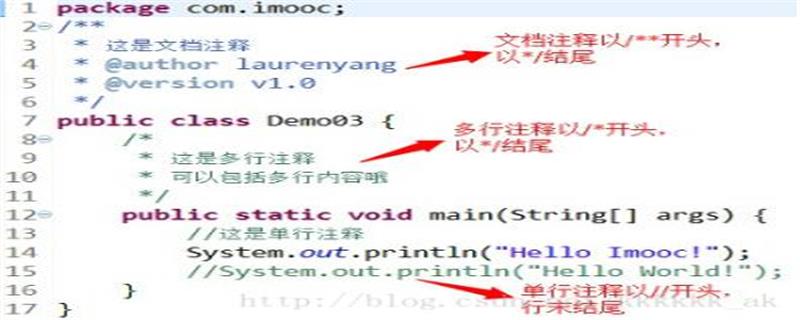How to comment in code and what are its benefits
In the code, you can use the Ctrl / shortcut key to comment the code, which helps us understand the code, speed up the development process and maintain code consistency
When we One thing you usually learn when learning HTML or CSS is how to write comments in your code. However, many developers still don't use annotations to their advantage. Today we will introduce how to use comments extensively in HTML and CSS to improve our workflow.
【Recommended course: HTML Tutorial】

##Importance of comments:
If we are doing an independent project, or are the only developer to review the code we have written, then we can Write code according to your own ideas. But if you are working with others, if the code does not have any comments, it will be difficult for others to understand and understand the meaning of the code. This will increase the burden of cooperation on the developers, but having comments will greatly reduce the burden.Benefits of learning to comment:
(1) Helps maintain consistency (2) Helps understand (3) Help with patches or quick fixes(4) Help speed up the development process(5) Help improve collaboration efficiencyNote :
Be careful not to write too long when commenting on the code. This will increase the redundancy of the code and avoid spending a lot of time writing unimportant comments.How to comment in the code
(1) In the HTML code:<body> <!--HTML代码--> <div>hello world!</div> </body>To comment the code in HTML, just add < !--Comment content--> That’s it, we can use the shortcut key Ctrl / to complete (2) In the CSS code:
<style>
div{
width:100px;
height:30px;
border:1px solid #ccc;
/*设置字体垂直居中*/
text-align: center;
line-height: 30px;
}
</style>The comment in CSS is /**/ , the shortcut key is Ctrl / (3) <script type="text/javascript">
// 点击div时改变其背景颜色
var div=document.getElementsByTagName("div")[0];
div.onclick=function(){
div.style.backgroundColor="pink"
}
</script> in JavaScript code, the comment in JavaScript is //, the shortcut key is Ctrl /Rendering Before clicking:


The above is the detailed content of How to comment in code and what are its benefits. For more information, please follow other related articles on the PHP Chinese website!

Hot AI Tools

Undress AI Tool
Undress images for free

Undresser.AI Undress
AI-powered app for creating realistic nude photos

AI Clothes Remover
Online AI tool for removing clothes from photos.

Clothoff.io
AI clothes remover

Video Face Swap
Swap faces in any video effortlessly with our completely free AI face swap tool!

Hot Article

Hot Tools

Notepad++7.3.1
Easy-to-use and free code editor

SublimeText3 Chinese version
Chinese version, very easy to use

Zend Studio 13.0.1
Powerful PHP integrated development environment

Dreamweaver CS6
Visual web development tools

SublimeText3 Mac version
God-level code editing software (SublimeText3)
 Conveniently use PyCharm shortcut keys to implement multi-line comments
Jan 27, 2024 am 08:02 AM
Conveniently use PyCharm shortcut keys to implement multi-line comments
Jan 27, 2024 am 08:02 AM
PyCharm multi-line comment shortcut keys: Make code comments more convenient and require specific code examples. In daily programming work, code comments are a very important part. It not only improves the readability and maintainability of the code, but also helps other developers understand the intent and design ideas of the code. However, manually adding code comments is often a time-consuming and tedious task. In order to make our code comments more efficient, PyCharm provides shortcut keys for multi-line comments. In PyCharm, we can use Ctrl+/
 How to Optimize the Maintainability of Java Code: Experience and Advice
Nov 22, 2023 pm 05:18 PM
How to Optimize the Maintainability of Java Code: Experience and Advice
Nov 22, 2023 pm 05:18 PM
How to Optimize the Maintainability of Java Code: Experience and Advice In the software development process, writing code with good maintainability is crucial. Maintainability means that code can be easily understood, modified, and extended without causing unexpected problems or additional effort. For Java developers, how to optimize the maintainability of code is an important issue. This article will share some experiences and suggestions to help Java developers improve the maintainability of their code. Following standardized naming rules can make the code more readable.
 How to comment multiple lines in go language
Jan 05, 2023 am 10:59 AM
How to comment multiple lines in go language
Jan 05, 2023 am 10:59 AM
In the Go language, you can use the multi-line comment character "/**/" to comment multiple lines of code. Multi-line comments (referred to as block comments) start with "/*" and end with "*/", and cannot be nested. The syntax is "/*comment content...*/"; multi-line comments are generally used Package documentation describes or comments into chunks of code snippets.
 How to add notes to saved passwords on iPhone
Feb 28, 2024 pm 07:41 PM
How to add notes to saved passwords on iPhone
Feb 28, 2024 pm 07:41 PM
iCloud Keychain makes it easier to manage your passwords without relying on memorizing or guessing website or usernames. You can do this by adding notes to existing passwords for apps and websites in iCloud Keychain. In this post, we will explain how to add notes to the passwords you save in iCloud Keychain on iPhone. Requirements There are some requirements you need to meet to use this new feature in iCloud Keychain. iPhone running iOS 15.4 or later Passwords stored in iCloud Keychain A valid Apple ID A valid internet connection How to add notes to saved passwords It goes without saying that you should store some passwords in iCloud Keychain
 A magical tool to improve code comment efficiency: make PyCharm your first choice
Jan 05, 2024 pm 04:14 PM
A magical tool to improve code comment efficiency: make PyCharm your first choice
Jan 05, 2024 pm 04:14 PM
PyCharm comment artifact: makes code comments easy and efficient Introduction: Code comments are an indispensable part of program development, whether it is to facilitate code reading, collaborative development, or to facilitate subsequent code maintenance and debugging. In Python development, the PyCharm annotation artifact brings us a convenient and efficient code annotation experience. This article will introduce the functions and usage of PyCharm annotation artifact in detail, and demonstrate it with specific code examples. 1. PyCharm annotation god
 PyCharm Annotation Operation Guide: Optimizing the Code Writing Experience
Feb 21, 2024 pm 06:27 PM
PyCharm Annotation Operation Guide: Optimizing the Code Writing Experience
Feb 21, 2024 pm 06:27 PM
PyCharm Comment Operation Guide: Optimizing the Code Writing Experience In daily code writing, comments are a very important part. Good comments not only improve the readability of your code, but also help other developers better understand and maintain the code. As a powerful Python integrated development environment, PyCharm also provides rich functions and tools in terms of annotation, which can greatly optimize the code writing experience. This article will introduce how to perform annotation operations in PyCharm and how to utilize PyCharm's annotations.
 The ultimate guide to PHP documentation: PHPDoc from beginner to proficient
Mar 01, 2024 pm 01:16 PM
The ultimate guide to PHP documentation: PHPDoc from beginner to proficient
Mar 01, 2024 pm 01:16 PM
PHPDoc is a standardized documentation comment system for documenting PHP code. It allows developers to add descriptive information to their code using specially formatted comment blocks, thereby improving code readability and maintainability. This article will provide a comprehensive guide to help you from getting started to mastering PHPDoc. Getting Started To use PHPDoc, you simply add special comment blocks to your code, usually placed before functions, classes, or methods. These comment blocks start with /** and end with */ and contain descriptive information in between. /***Calculate the sum of two numbers**@paramint$aThe first number*@paramint$bThe second number*@returnintThe sum of two numbers*/functionsum
 What are the ways to write comments in php
Aug 16, 2023 pm 02:03 PM
What are the ways to write comments in php
Aug 16, 2023 pm 02:03 PM
PHP comments are written as follows: 1. Single-line comments, starting with "//", followed by comments, used to explain a specific part of the code; 2. Multi-line comments, starting with "/*", ending with " */" ends, spans multiple lines, and can be used anywhere in the code to explain a piece of code in detail; 3. Document block comments, starting with "/**" and ending with "*/", use Use special tags and syntax to specify the format of the document; 4. Others, such as # are usually used to temporarily block a line of code, //TODO is used to mark to-do items.







